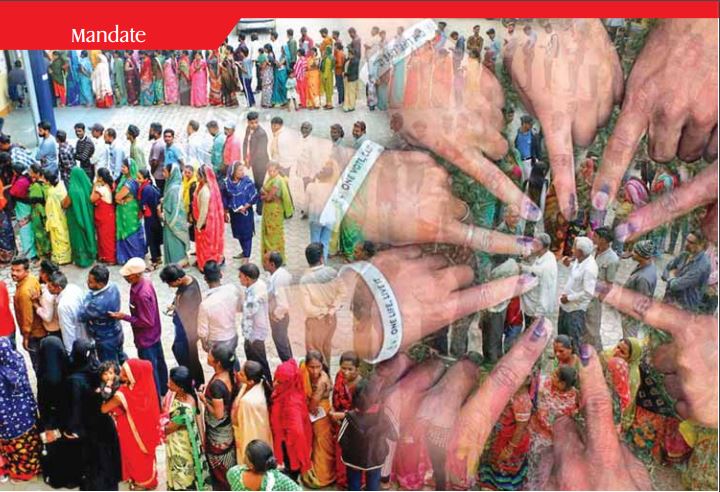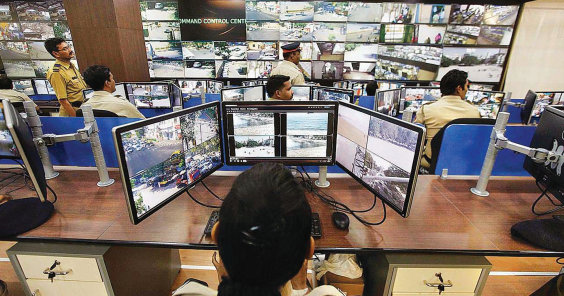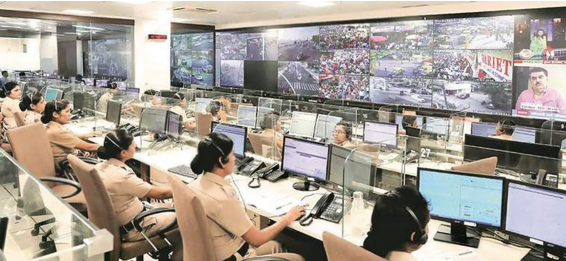General elections were held in India from 19 April to 1 June 2024 in seven phases, to elect 543 members of the Lok Sabha. More than 968 million people out of a population of 1.4 billion people were eligible to vote, equivalent to 70 per cent of the total population. 642 million voters participated in the election and 312 million of them were women, making it the highest-ever participation by women voters. This was the largest-ever election, surpassing the previous election, and lasted 44 days, second only to the 1951–52 Indian general election. Votes were counted and the result was declared on 4 June to form the 18th Lok Sabha. India’s sitting lower house of parliament (Lok Sabha) began its term on June 15, 2019, which is set to conclude on June 16, 2024.
In what is the world’s largest electoral exercise, India’s voter base of 970 million citizens, spanning 28 states and eight union territories, will vote under a seven-phase schedule. India’s 2024 general election dates have been staggered from April 19 to June 1, per the Election Commission of India (ECI). India holds its elections in sequential phases by regions carefully staggered by the ECI. The dates of polling announced by ECI across the seven phases will be April 19, April 26, May 7, May 13, May 20, May 25, and June 1. In some states like Bihar, West Bengal, and Uttar Pradesh, voting will take place on all seven days; in others, like Arunachal Pradesh and Sikkim, it will only take place on one day.
This election will be the second longest polling exercise in India’s electoral history, after the country’s first-ever election, which was held over a five-month-period between September 1951 and February 1952. Organising a general election in India has been a Herculean challenge, mostly due to the vast terrain that stretches from the Himalayas in the north to the desert in the west and the coastal regions in the south. Electoral rules also mandate that a polling station must be within 1.2 miles of every home, and nearly every vote is cast electronically. In 2019, 1.74 million electronic voting machines were used across more than one million polling stations. Nearly 15 million polling officials and security personnel will be tasked with manning polling stations during balloting. To reach every voter, they travel to all parts of the country, including by trekking through glaciers in the Himalayas or wading through deep forested valleys in remote states like Arunachal Pradesh. The staggered polling allows the government to deploy tens of thousands of troops to prevent political violence and transport electoral officials and voting machines.
It is an expensive process too. In 2019, political parties and candidates spent an estimated $8.7bn for their campaigns, according to the Carnegie Endowment for International Peace.
How security arrangements will take place
during polls?
The Lok Sabha elections were held in seven phases, between April 19 and June 1, 2024. The results were announced on June 4. Elaborate security measures had been taken to ensure free, fair and peaceful elections across the nation.
The Election Commission of India implemented a series of stringent security measures nationwide to ensure peaceful polling in all 28 states and 8 Union Territories. Nearly 97 crore people were eligible to cast their votes in the polls at over 10.5 lakh polling stations.
The Lok Sabha elections held in seven phases beginning from April 19, April 26, May 7, May 13, May 20, May 25 and June 1, saw approximately 1.5 crore polling officials who were deployed nationwide to oversee the electoral processs.
Chief Election Commissioner Rajiv Kumar addressing the much-anticipated conference said that strict directions have been given to District Magistrates and Superintendents of Police to ensure a level playing field for all parties: “CAPF is to be deployed adequately and assisted by the integrated control rooms in each district. Check posts and drones to ensure vigil. Ensuring voters’ trust is paramount. Violence in elections is unacceptable. Impersonators are to be swiftly punished. Transparency in permissions to parties/candidates through the SUVIDHA portal.”
Challenges to conduct free and fair elections
The CEC highlighted the challenges in conducting free and fair elections through four M’s: muscle, money, misinformation, and MCC violations. “Tackling misinformation in today’s digital age is complex. We have put certain measures in place to ensure misinformation is nipped in the bud. We’re proactive in debunking fake news. Originators of fake news are to be dealt with severely as per extant laws,” he added.
The Election Commission has prioritised several key points for ensuring a safe polling process. These include transfer of officials for impartiality, randomisation of polling staff and participation of polling agents at every booth. The aim of these directives is to ensure transparency and prevent of discriminatory action against party workers.
Additionally, 24×7 integrated control rooms and webcasting in sensitive polling booths have been set up. Drone-based checking at borders will take place along with a full surveillance of history sheeters. CEC Kumar also urged political parties to refrain from personal attacks and foul language.
The Election Commissioner stated that over 2,100 general, police, and expenditure observers are being deployed for the upcoming elections, which will oversee force deployment and randomisation of personnel and machines and conduct intimidation-free elections. The Commission also directed enforcement agencies to crack down on illicit money, liquor, drugs and freebies, reporting a surge of 800% to Rs 3,400 crore in 11 States in the 2022-23 election cycle.
Chief Election Commissioner Rajiv Kumar said that there is no place for bloodbath and violence in the elections. “From wherever we will receive the information of violence, we will take action against them,” he said.
“Elections aim for key outcomes: enhanced citizen participation and zero violence. The Commission strives for reduced repolls, no inducements, clear campaigns, and curbing fake narratives. Ensuring a successful electoral process is top priority,” Kumar added. The ECI has also offered 27 apps and portals for all stakeholders, including cVigil which empowers citizens to report MCC violations and assured action within 100 minutes.
What do the numbers say?
According to the Election Commission, there are 97 crore registered voters across India who will vote in the upcoming Lok Sabha polls. Among them, 49.70 crore are male voters and 47.10 crore are female voters. “We have 1.8 crore first-time voters and 19.47 crore voters between the age group of 20-29 years,” said Chief Election Commissioner Rajiv Kumar.
The ECI further said that 82 lakh PwDs, 2.2 lakh 100+ and 48,000 third-gender voters will participate in the elections. Over 85 lakh first-time women voters will participate in the elections and 12 states have an elector gender ratio of about 1,000
The Election Commission said 102 constituencies will go for polls in the first phase on April 19, followed by 89 constituencies in the second phase on April 26. The second phase will be held on April 26, the third on May 7 and fourth on May 13, fifth on May 20, sixth on May 25 and seventh phase on June 1. In the first phase, 102 constituencies will go for polls, 89 constituencies in the second phase, 94 constituencies in the third, 96 in the fourth phase, 49 in the fifth phase, 57 in the sixth phase and 57 in the seventh phase.
The Election Commission deployed 3.4 lakh Central Armed Police Forces (CAPFs) personnel, in addition to state police forces, for the upcoming seven-phase Lok Sabha elections and assembly polls in four states starting from April 19, officials revealed. The highest number of CAPFs personnel, totaling 92,000, were stationed in the politically charged state of West Bengal, followed by 63,500 personnel in Jammu and Kashmir, which is grappling with militancy issues, and 36,000 personnel in Naxal-affected Chhattisgarh.
In response to requests from state Chief Electoral Officers (CEOs), the Election Commission has decided to gradually deploy approximately 3,400 companies of CAPFs across all states and Union territories to ensure the smooth conduct of free and fair elections. Each CAPF company typically consists of around 100 personnel, with the full mobilization of forces expected to be completed in the coming days.
The assembly elections in Andhra Pradesh, Arunachal Pradesh, Odisha, and Sikkim will coincide with the Lok Sabha polls. It is anticipated that a maximum of 920 companies of CAPFs were deployed in West Bengal, followed by 635 companies in Jammu and Kashmir, 360 companies in Chhattisgarh, and varying numbers in other states.
The CAPFs encompass agencies like the Central Reserve Police Force (CRPF), Border Security Force (BSF), Central Industrial Security Force (CISF), Indo-Tibetan Border Police (ITBP), Sashastra Seema Bal (SSB), and National Security Guard (NSG), with a combined strength of around 10 lakh personnel.
The mobilization of forces for sensitive and hyper-sensitive constituencies began on March 1, with about 2,000 companies being deployed for pre-poll duties. Approximately 1.5 lakh personnel are expected to travel via roads and railways for this mobilization, with the Railways ensuring seamless transportation with appropriate facilities.
The CAPF personnel will undertake various election-related tasks such as area dominance, confidence-building measures, guarding of electronic voting machines, and security at counting and strong room centres during the electoral process.
Dance of Democracy Indian General Elections 2024






